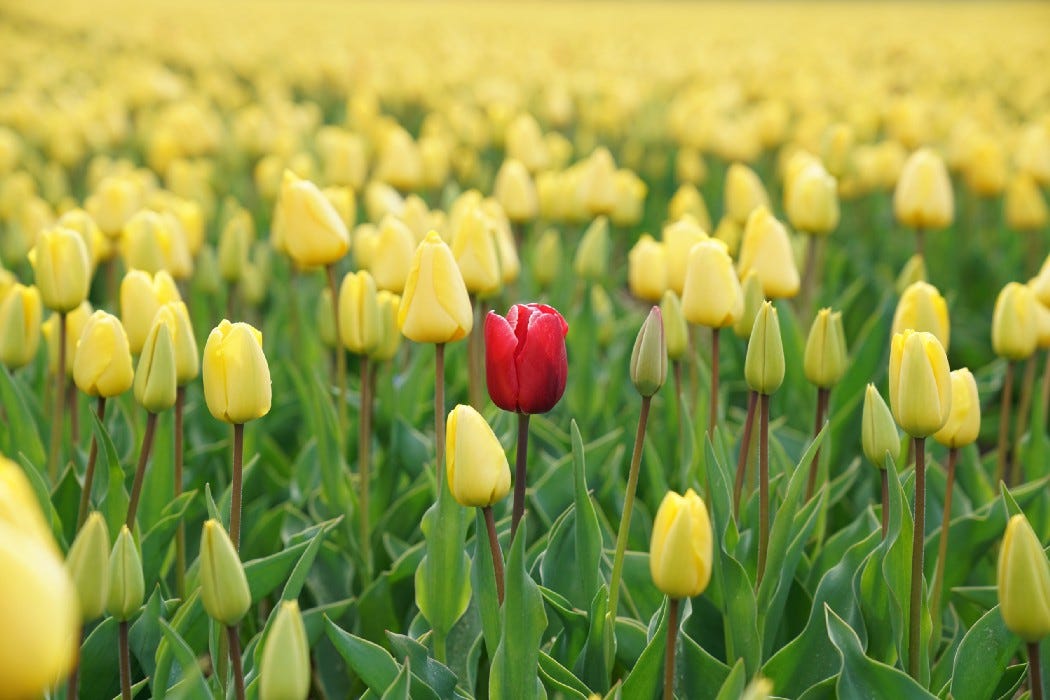Changing Your Career to UX / Product Design
By Patrici @ Dream Design Job
March 26, 2021
👋 Hello. So you are considering joining an UX bootcamp, or wandering into the beautiful abyss that is a career in Product Design!
How did you get into UX design? Did you have much design experience?
It’s a complex answer because, technically, I started working life as a self-taught graphic designer having never studied anything design-related. It took me a long time for me to evolve my career toward UX, but that doesn’t necessarily mean it would for you. Here’s what happened, along with some lessons I learned along the way:

UX Life Lesson #1: Don’t be afraid to ask for help, especially if you’re learning on your own
Growing up, design was “my thing” for a long time, along with aspiring to write and make movies. Because I was painfully shy and anxious, I had a lot of time and opportunities in high school and college to learn design tools and minor coding.
Also because I was painfully shy and anxious, I convinced myself I could learn everything on my own (thus saving me the embarrassment of showing anyone my work unless absolutely necessary), and so I had a sad dearth of mentorship during my formative years of messing with palettes and layers. This meant career-blossoming happened much slower for me than it would have if I went to school with a community to help me get better at my craft and inspire me to take risks.
UX Life Lesson #2: Being humble =/= being excessively self-deprecating
I have improved more in the past 5 years than I did in 10 years of fearing rejection and feedback, because this time I am tapping into people I admire without judgment of myself or others, and I am admitting that I know nothing.
That’s not to say that “knowing nothing” means you don’t have anything to offer. For me it meant truly understanding my strengths rather than beating myself up for the gaps between my current skillset and where I want to be. For example: when I first learned about UX, I realized that unlike straight-up graphic design, it was way more than just stunning visuals. UX is also understanding humans. I didn’t know at the time that my Psychology major would also help set me up perfectly for UX. And as the job market woke up, my background became a strength of mine, rather than a regret (just kidding, I never regretted Psychology) — especially as recruiters stopped looking at whether or not designers went to art school or studied HCI.

UX Life Lesson #3: Develop a unique point of view by making moves that feel good for your soul. Like Steve Jobs said: “You can’t connect the dots looking forward; you can only connect them looking backwards. So you have to trust that the dots will somehow connect in your future. You have to trust in something — your gut, destiny, life, karma, whatever.”
It’s totally true. This quote gave me hope when I was young and swimming against the current of uncertainty, and now that many years have passed since I first heard these words spoken…I am a firm believer in whatever.
When I chose my major — which should never be a life or death decision, might I add — I made a bet that “understanding the way I think” and “understanding the way humans think” would be a foundational skill for life and work in general, if only because humans are everywhere, and also because I wanted to make sure I could manage my own mental chaos. This bet of mine, along with me continuing to mess around on Photoshop (then Sketch, then Figma), turned out to be a pretty good move.
Did you have any experience with UX before switching careers?
Kind of. What I realized was that UX–at least as it has evolved to be palatable to organizations–is just a term created to establish process and emphasis around a practice that is already intuitive to a lot of people: understanding what humans want and need.
I had some training in this because of my Psychology background, but I also learned how to reframe the random things I did like customer service, hospitality, and project management, into UX. All of these roles required making sense of humans– especially customer service! I had worked so many odd jobs prior to UX that I could pull from all of it (thanks, last recession). Just like AOC practiced taking no BS from Congress from her years of food service and bartending, all of your life experience is valuable because companies want to design for real people who know the real world.
What is the difference between an in-person UX bootcamp compared to online UX courses?
My in-person bootcamp allowed me to create the education I needed to fill in the gaps in my experience, which was all mostly soft skills applicable to any job (networking, interviewing, talking about myself, etc.) The program was also genius in highlighting the importance of managing your own psychology and building the support to endure the job search. This is not something to be ignored.
That being said, online bootcamps have likely come quite a long way since I started, and I wouldn’t rule them out– especially if they emphasize collaborative learning, mentorship, and network-building. I notice many of them also have a substantial visual design component, which is essential for students who may not come in with a visual background.
What bootcamp did you go to, and would you recommend it? Are bootcamps helpful with finding more career opportunities?
I got lucky and was referred to Tradecraft. I had been considering General Assembly and longer programs online, but since I already had some skills in visual design, I decided that I didn’t need visuals to be an emphasis which was present in a lot of online programs.
I needed more help understanding the strategy behind sustaining a design career in a totally unfamiliar industry to me, and Tradecraft was flexible in providing the springboard to focus on how exactly to do that. I would advise you to know your strengths, your point of view, and what you need to learn to leverage that point of view. Your path is not the same as mine or anyone else’s. Choose your bootcamp from there, because just going to a bootcamp will not guarantee a job; the timing of these is so short, that being strategic with what you’re learning during a bootcamp is crucial.
How long did it take you to find a full-time UX job?
It took me 6 months after my bootcamp to find a full-time job. For some people it takes less, or more. Those 6 months, I didn’t stop– I was finishing up contracts and projects that I had started at Tradecraft, working odd jobs again, and interviewing at the same time (I took out a loan that needed to be paid back ASAP so there was a lot of motivation there.)
But remember what Picasso said to that one guy who exclaimed, “How dare you charge me $5 million for this 5-minute napkin drawing!”
And Picasso responded,
“It didn’t take me 5 minutes, it took me my whole life.”
That’s what getting into UX felt like. I think for many people who switch careers, it feels like this, especially because of what I mentioned earlier: if you’ve already been working a long time in a variety of experiences, your unique point of view and exposure to different working styles and slices of life will be valuable to whatever your next job is.
Did you use additional resources to learn UX? i.e. Medium, the Interaction Design Foundation, YouTube?
Yes, and I still do. Although there’s so much out there that I have to be very intentional about what I read. I keep tabs on design trends maybe once a month, but the rest of my daily intake is focused on specific problems or challenges that I have at the moment, like research articles when I’m forming studies, analyses about effective dashboards, how to collaborate on data strategy, etc.

What were some of your greatest barriers during the transition phase?
Being a new bootcamp grad is really, really, hard because everyone has to go through millions of rejections. I’m not gonna lie, most working designers are kind people, but at times you may encounter harsh and condescending vibes. When that happens, put on the empathy lens and see the sheer number of candidates they screen, the stress and demands they could be under. Try not to take it personally, and if the experience is exceptionally off, maybe working with them is actually not a great idea anyway.
Post-bootcamp is a long trial and error period. From whiteboarding to portfolio presentations and networking, graduates of bootcamps are going to mess up a lot. But they’re also going to get back up again! I’m going to emphasize again the need to make time for managing your psychology, especially during this phase.
There were hundreds of rejections, and yes it does wear on you. I made so many embarrassing mistakes that I would rather not recall, especially while trying to reframe my perspective on networking. But you keep going, ask for feedback (without getting defensive), try new things and get whatever small jobs you can, and one day the thing you’re destined for will find you.
How did you make yourself stand out as a designer?
The biggest thing I’m told that stands out is that I am self-taught and did not study art or UX in school, and also had that Psychology background. That’s not to say if you studied art and don’t have a Psych background, it will work against you; wherever you come from is just a different and equally strong story, a different point of view to be refined.
Also, going back to my point about being able to reframe your prior experience: whenever it’s relevant, own your background and what it brings to the table. I got an interview with a food service app by writing in my cover letter that I have restaurant serving in my past, and know the pains well. Every opportunity is different. Every time you encounter one you’ll need to how you might fit into the picture. Start getting good at uncovering which pieces of your life highlight your unique point of view.
What is life like for you now that you’re a full-time UX Designer?
It is so much fun. I can do challenging and creative work 40 hours a week (while striving for kindness, as design work affects real people). Gravitating to UX also happened at a time when I was changing the way I think about life and work. I’m not sure which came first, it’s kind of a chicken and egg scenario.
I still dream of writing and making movies, and I am pretty sure I can still do all of the above at some point. In fact, at one job I directed an animated design, and it felt almost like I was directing a mini-movie (Perspective!)

What is one thing you would tell someone who is switching careers to be a designer?
This advice is for career switchers in general, especially those who are doing it for fulfillment and financial stability. If I can provide takeaway from this whole story, it’s 1) know your priorities and 2) again, a balanced perspective is everything. There is definitely a benefit to being laser-focused on a super lofty and specific career goal: like one day becoming Director of Design at a fun startup! Getting a sci-fi story published in the New Yorker! Achieving a high six-figure salary as a marine biologist! Write the next Netflix hit! (Or right now, during quarantine: Be able to pay my rent and buy food!)
Hyper-specific north star goals are amazing, and with true laser-focus, having them can often get you to those places. But I knew my other North Stars were feelings, like sustained comfort and peace. Since I’m someone who can go too far in the accomplishments direction, learning to have these emotional goals softened my laser-focus into a higher-level aim instead of just hardcore material achievement. Aiming for “living a kind and creative life,” whatever that looked like, in whatever job I had, released a lot of pressure. It completely destroyed the presence of burnout, helped me to see opportunities I would’ve previously ignored or overthought into oblivion, and most importantly it shifted my worries away from survival so that I could focus on what was possible and in front of me, instead of what I perceived as out of reach.
Think of this as a time to evolve. You are evolving, and the design industry will definitely evolve to be more inclusive and essential to whatever is to come. This quarantine is hard on many, but I guarantee that design thinkers will be a part of rebuilding the parts of society that need some love — whether they call themselves design thinkers or not.
My biggest learning from living the last recession was to stay open to possibilities and growth, and not to be ashamed of saying “I don’t know.” Uncertainty is where the best design starts.
✌🏽
TL;DR
Sure, I was self-taught in design tools for ~20 years of my life and have some design experience, but paths to UX look very different for everyone.
You can work hard and learn the tools, but perspective is everything. The great thing is, whatever life experience you have is a foundation for being a designer because it’s important to design with a unique point of view, otherwise we end up with services and products that only serve a few.
Everyone has one of those, and yours matters.